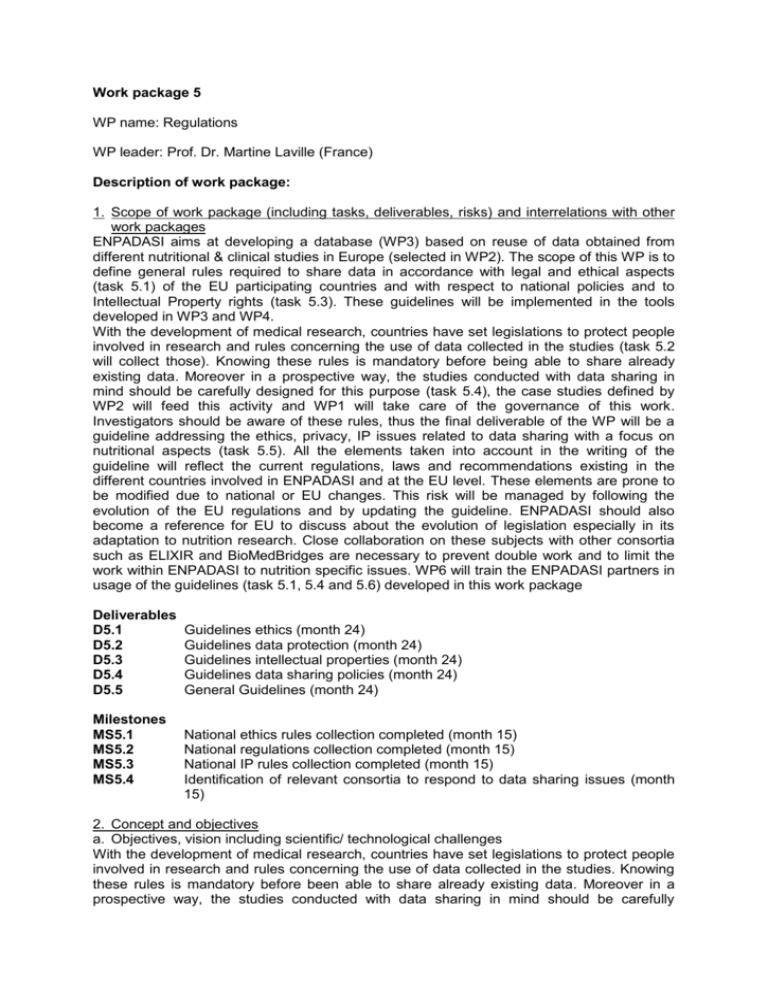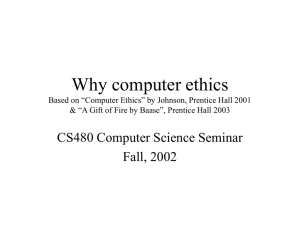Work package 5 WP name: Regulations WP leader: Prof. Dr. Martine
advertisement

Work package 5 WP name: Regulations WP leader: Prof. Dr. Martine Laville (France) Description of work package: 1. Scope of work package (including tasks, deliverables, risks) and interrelations with other work packages ENPADASI aims at developing a database (WP3) based on reuse of data obtained from different nutritional & clinical studies in Europe (selected in WP2). The scope of this WP is to define general rules required to share data in accordance with legal and ethical aspects (task 5.1) of the EU participating countries and with respect to national policies and to Intellectual Property rights (task 5.3). These guidelines will be implemented in the tools developed in WP3 and WP4. With the development of medical research, countries have set legislations to protect people involved in research and rules concerning the use of data collected in the studies (task 5.2 will collect those). Knowing these rules is mandatory before being able to share already existing data. Moreover in a prospective way, the studies conducted with data sharing in mind should be carefully designed for this purpose (task 5.4), the case studies defined by WP2 will feed this activity and WP1 will take care of the governance of this work. Investigators should be aware of these rules, thus the final deliverable of the WP will be a guideline addressing the ethics, privacy, IP issues related to data sharing with a focus on nutritional aspects (task 5.5). All the elements taken into account in the writing of the guideline will reflect the current regulations, laws and recommendations existing in the different countries involved in ENPADASI and at the EU level. These elements are prone to be modified due to national or EU changes. This risk will be managed by following the evolution of the EU regulations and by updating the guideline. ENPADASI should also become a reference for EU to discuss about the evolution of legislation especially in its adaptation to nutrition research. Close collaboration on these subjects with other consortia such as ELIXIR and BioMedBridges are necessary to prevent double work and to limit the work within ENPADASI to nutrition specific issues. WP6 will train the ENPADASI partners in usage of the guidelines (task 5.1, 5.4 and 5.6) developed in this work package Deliverables D5.1 D5.2 D5.3 D5.4 D5.5 Milestones MS5.1 MS5.2 MS5.3 MS5.4 Guidelines ethics (month 24) Guidelines data protection (month 24) Guidelines intellectual properties (month 24) Guidelines data sharing policies (month 24) General Guidelines (month 24) National ethics rules collection completed (month 15) National regulations collection completed (month 15) National IP rules collection completed (month 15) Identification of relevant consortia to respond to data sharing issues (month 15) 2. Concept and objectives a. Objectives, vision including scientific/ technological challenges With the development of medical research, countries have set legislations to protect people involved in research and rules concerning the use of data collected in the studies. Knowing these rules is mandatory before been able to share already existing data. Moreover in a prospective way, the studies conducted with data sharing in mind should be carefully designed for this purpose. Investigators should be aware of these rules. Thus this WP aims to collect national and EU rules on Ethics, Data protection, IP sharing in order to define an ENPADASI policies on these aspects that should be observed in a prospective way in future studies. All these rules should be implemented in guidelines that will be used for training. All this work should be maintained and considered in the governance plans of WP1. ENPADASI should also become a reference for EU to discuss about the evolution of legislation especially to adapt them to nutrition research. b. State of the art Legislations about ethical considerations concerning people involved in research have been put in place in EU countries with national rules and for sharing the global principle of Helsinki statement is developed. Having transnational studies or sharing data from different countries should respect the national specificities. Studies concerning Nutrition have not the same status as those on drugs, these specificities varied among countries. ECRIN has already done a mapping on the different legislation across EU countries. With the development of technology for information and Communication (TIC), personal data protection became an issue. In 1981, the convention 108 of the Council of Europe has established principles and rules about data protection. In 2014, a manual on the European legislation about data protection has been written by the European Union Agency for fundamental rights together with the European Court of Human rights and of Council of Europe that summarizes all these rules. Sharing data means also sharing Intellectual Property on the outcomes with regards of the input of each contributing parties. Several consortiums have already established rules for IP sharing. National rules and uses of the members of ENPADASI should be mapped. With these examples a comprehensive internal policy framework should be put in place to guide members of the project in issues that deal with intellectual property rights, data ownership, data sharing and scientific publishing as well as new scientific discoveries. a. Scientific/ technological concept ENPADASI aims at developing a database based on re-use of data obtained from different nutritional & clinical studies in Europe. Sharing data in Europe means national and European rules related to ethics, privacy, IP are respected. National rules and uses of the members of ENPADASI should be mapped. With these examples a comprehensive internal policy framework should be put in place to guide members of the project in issues that deal with intellectual property rights, data ownership, data sharing and scientific publishing as well as new scientific discoveries. 3. Management The WP will be managed by the WP leader, Pr. Martine Laville, in close collaboration with leaders of the individual tasks. Participation of at least 1 person per country will be mandatory to be able to deal with the national regulations. Since few fees will be available for travelling much of the management will be performed using teleconferences with involved partners and task leaders. Annual meetings will be conducted as part of the annual ENPADASI meetings. Each partner will be responsible for their own reporting to their funders but the work input from each partner will be made visible as a reference for all reporting activities 4) Potential impact on the advancement of the research area, capacity building, plan for translation of research (suitable for ENPADASI) into public health practice or policy (in 2 years, with a perspective on a longer term) Sharing data in Europe implies to respect national rules related to ethics, privacy, IP from the different partners. The global aim is to map the national rules of ENPADASI members and produce guidelines with all these rules that will allow data sharing. These rules will be tested in WP2 and WP3 during case study and used for training in WP6. In the future, the guidelines could be expanded to other European countries and could be considered as the reference guidelines of data sharing. 5. Overall strategy of the work plan The WP will be divided into 5 tasks: Ethics, Data protection, Intellectual property, Data sharing policies, and general guidelines Task 5.1: Ethics - Eol 38 [lead], Eol35, 37, 41, 50, 51, 56+66, 64, 65, 71, 75 link with WP6 – Month 1-20 Task 5.1.1: Mapping of the national ethics guidelines and procedures (using a template that will be filled out). Each representative of the participant countries (Belgium, Denmark, Germany, Spain, Estonia, France, Ireland, Italy, The Netherlands) will map their current legislation, committees involved, procedures required. This task will focus on special rules related to nutrition research should be recorded, as ECRIN has already mapped the medical related rules. Specific considerations for specific population groups should also be taken into account. Task 5.1.2: Track, share, and take into account European recommendations. ECRIN has already listed ethics rules and regulation for Nutrition in the different EU countries and will help to find common procedures for future transnational studies. The guidelines developed in this task will be used as training material in task 6,1. Related deliverable and milestone: D5.1: Guidelines on ethics available on ENPADASI website. They will be actively shared with other initiatives as ELIXIR, BioMedBridges, BioNH joint programming activity and DEDIPAC (Fig 2). They will take into account the different national rules for adapted procedures allowing data sharing including new alternatives and timing for consent (e.g. e-consent, consent for reuse of data), MS5.1 Task 5.2: Data protection - Eol 37 [lead], EoI35, 50, 51, 56+66, 65, 75 (partners from all countries) – Month 1-20 Data sharing will be conducted within the privacy and data protection boundaries. Procedures to safeguard privacy protection of ENPADASI must be defined. Database must be processed in line with the rights of data subjects. Currently, many data cannot be used publicly due to privacy constraints and confidentiality rights. It is expected that the procedures developed in ENPADASI to address these issues will be applied and tested on this database, potentially leading to open access use of these resources in due course. Task 5.2.1: Mapping of the national regulations. Each representative of the participant countries (Belgium, Denmark, Germany, Spain, Estonia, France, Ireland, Italy, and The Netherlands) will map their current legislation, committees involved, procedures required. The subject’s access to own data, ownership of patient’s data, legal reasons to (not) support subjects who object to reuse of their data in research etc. will require consideration with regards of national rules. Personal Identifiable Information (PII) will be processed fairly and lawfully so as to pursue specific and legitimate research purpose. Participants will be explained how their PII will be used and their rights regarding their PII and how possible data will be made anonymous. State-of-the-art cryptography will be used to ensure security and privacy. Authentication and authorization will support the highest available standards. Task 5.2.2: Mapping of the potential EU regulation. Existing and regulation that is in development on data protection at the EU level will be recorded. Policies of other EU consortium should be mapped. The guidelines developed in this task will be used as training material in task 6,1. Related deliverable and milestone: D5.2: Guidelines of National and EU legislation for personal data protection available on ENPADASI website. They will and actively be shared with other initiatives as ELIXIR, BioMedBridges, BioNH joint programming activity and DEDIPAC. They will be outlined and summarized in general guidelines applicable in all countries and allowing the use of the data for data sharing, MS5.2 Task 5.3: Intellectual property - Eol37 [lead], EoI35, 50, 56+66, 65, 75, (partners from all countries) – Month 1-20 The promotion of scientific production established from data reuse is a sensitive issue that has to be clarified. Intellectual property must not be an obstacle to access to inventions, results of applied research, drug, innovation, etc. This is why intellectual property rights have to be anticipated to deal with the issue of authorship of knowledge derived from the data and allowing the recognition of the crucial work to generate public health research datasets. Indeed IP must balance the rights and responsibilities of those who have provided samples, those who generate and those who use data. However, there are so far no judicial decisions, doctrines, or publications strictly speaking about the health data, research and IP. In 2007, Organization for Economic Co-operation and Development (OECD) has provided Principles and Guidelines for access to Research Data from Public Funding. IP rights are owned by the contributing partners where the research was performed and endorse subsequent liabilities. Data sharing implies to address the storage and access security issues thereby the data owners will be involved in this additional work, this will be done in relation with task 2. Technical and organizational security safeguards will be adopted to prevent accidental or unlawful destruction, loss, alteration, disclosure or unauthorized access (this work will be used in WP3). Task 5.3.1: Mapping of the national IP rules. Each representative of the participant countries (Belgium, Denmark, Germany, Spain, Estonia, France, Ireland, Italy, The Netherlands) will map their current legislation relative to IP rights taking into account industry sponsored trials and Public funded research. Task 5.3.2: Mapping of the rules established at the EU level for IP in data sharing. This work was already done by many other EU consortia, e.g., Cancer Genomic Consortium, ECRIN or SPIDER DSA project. In the earlier work will be updated and checked whether all nutritional aspects were already considered. The guidelines developed in this task will be used as training material in task 6,1. Related deliverable and milestone: D5.3: IP Guidelines available on ENPADASI website. They will and actively be shared with other initiatives as ELIXIR, BioMedBridges, BioNH joint programming activity and DEDIPAC: Compilation of national and EU rules in a guideline to manage ownership and transfer of data inside ENPADASI consortium in agreement with relevant national and EU legislation and to guarantee an adequate regulatory protection, MS5.3 Task 5.4: Data sharing policies - Eol75 [lead], EoI35, 37, 41, 45, 50, 51, 56+66, 65, 71, 75 link with WP1-WP2-WP3-WP4 – Month 12-20 There is a general lack of data sharing policy harmonization, due to difference in existing policies for sharing research participant level data outside the institution and inconsistencies in policies within an institution or a country. The data sharing principles of ENPADASI database (developed in WP3) will be defined in this task in close collaboration with WP1 relative to governance and internal structuration. The internal policy framework will guide members’ consortium in issues that deal with obligations to research participants’ privacy, IP rights, data ownership, data sharing and scientific publishing. WP6 will take care of training the ENPADASI members on those issues (WP6 task1). In this task, the following points will be successively addressed: - Which kind of data will be shared? Data-sharing is based on data re-use. Identifying pre-existing data relevant for nutritional phenotype assessment in the scope of ENPADASI. Defining rules for future data collection to consolidate the usefulness of the system for future study designs and data analysis. Defining rules for sharing metadata (see work done in the Phenotype database and the ISA-TAB standard) and datasets, should be done in close collaboration with WP4 (development of ontologies) - Who will possess the data ownership? Depending of the provided data, industry sponsored trials and Public funded research will be considered. Rules for sharing data must take into account Intellectual Property which refers to data collected from a study performed by at least one consortium member - Who will have an access to the data? Defining the level of openness of the database and restricted access to research data centers. Defining rules for database access to use for external collaborations as well as supplementary analyses within each consortium. All knowledge and instruments developed by this consortium will adhere to open access and open source principles - Which types of utilization will be allowed? Detailing how the data will be used and if relevant tackling the commercial exploitation issue. Development of policies and procedures to share data both from the perspective of researchers and of journal editors (together with ELIXIR to make sure that other scientific fields are not preforming the same tasks). - What is time to data access? Studying the question of an embargo for the recent data and duration for data access once database established. Some policy issues that could challenge the possibility to connect data. Task 5.4.1: Mapping of the data sharing policies established at the EU level by different consortium and by the JPI task force. Different consortiums already established data sharing policies, e.g., EuroDISH. Task 5.4.2: Definition of general policies of ENPADASI. It will take into account the guidelines established in tasks 1,2,3 and in agreement with the governance of ENPADASI and with case studies done in WP2 and 3, give a definition of the policies for data sharing in ENPADASI. The guidelines developed in this task will be used as training material in task 6,1. Related deliverable and milestone: D5.4: Guidelines describing data sharing principles of ENPADASI database and available on ENPADASI website, MS5.4 Task 5.5: General guidelines about regulations - Eol37 [lead], EoI35, 56+66, 65, 71, 73, (partners from all countries) link with WP6 – Month 21-24 A specialized guideline containing instructions about specific issues of data sharing regulations will emanate from each task presented above. Firstly, ethics rules will be determined in order to propose adapted procedures for data sharing inside ENPADASI consortium, taking into account specific population groups and nutritional studies specificities. Then, legislation for personal data protection, to be applied for data sharing inside ENPADASI consortium, will be described from national and European effective legislations. Intellectual property rights will be established to characterize ownership of results arisen from ENPADASI database. Lastly, from examples of relevant consortia, policies will be proposed for application in ENPADASI consortium. The aim of the current task is to compile each previous guideline to provide a general guideline describing data sharing principles and promotion in ENPADASI project. The aspiration of this guideline is to constitute a reference for ENPADASI members and to allow an efficient data sharing in accordance with individual and collective interests. For this purpose, any participant prior to provide data must agree to adhere to the aforementioned principles. The guidelines developed in this task will be used as training material in task 6,1. Related deliverable: D5.5: The general guideline will be available on ENPADASI website. The recommendations could be used for training purposes in collaboration with WP6.








